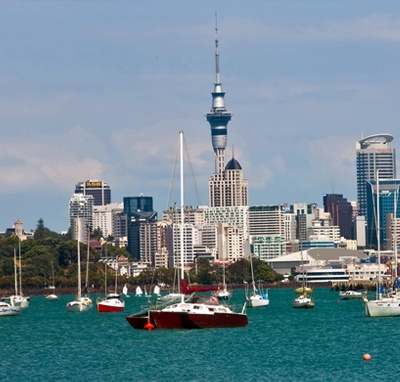Studying In New Zealand
A qualification from New Zealand ranks with the best in the world. It is seen as internationally desirable because students have a high level of practical and theoretical competency when they graduate.
New Zealand is an easy, safe place to live and New Zealanders are as famous as the Irish for their warmth and hospitality. A multiracial, multicultural country, it makes students feel at home, find friends quickly and experience the moving, spiritual culture of New Zealand. New Zealanders are, by nature, inquisitive and adventurous. They encourage new, independent thinking, exploration and research. As a result, New Zealand degrees have a reputation around the world for being practical, modern and desirable.

A qualification from New Zealand ranks with the best in the world. It is seen as internationally desirable because students have a high level of practical and theoretical competency when they graduate.
New Zealand is an easy, safe place to live and New Zealanders are as famous as the Irish for their warmth and hospitality. A multiracial, multicultural country, it makes students feel at home, find friends quickly and experience the moving, spiritual culture of New Zealand. New Zealanders are, by nature, inquisitive and adventurous. They encourage new, independent thinking, exploration and research. As a result, New Zealand degrees have a reputation around the world for being practical, modern and desirable.
- Globally recoganised qualification
- 20 Hours/week part-time work permit
- Work full-time on holidays
- Earn Extra points for Migration
- Courses with Intership
- Dependent Visa
- Dependent/Spouse can work Full-Time
- IELTS with Minimum 6.0 Bands
- Upto 3 Years Stay Back after course
Living in New Zealand
New Zealand's high quality living conditions are well known universally, and accommodation is one aspect of this. In many cases, accommodation will be only minutes away from your place of study. Most educational institutions will assist you to find accommodation.
The main options are:
Halls of Residence/Student Hostels
These are usually located on the campus or nearby, with single or twin rooms. Bed linen and cleaning facilities are provided. Meals are eaten in a communal dining hall, with special dietary needs catered to. A warden lives on site, and social and cultural activities are organised for residents. Hostels usually have computer laboratories and recreation rooms. Some institutions provide “self-catering” hostels where 6-8 students have their own bedrooms and share a kitchen and living room.
Cost: approximately $250 per week.
Some cities have self-catering private or independent hostels. Cost of furnished room, shared kitchen and lounge facilities is $100 – $150 per week, plus utilities (power, water, etc.)
Home stay/Private Board
This is a room of your own in a suburban house, usually with a garden and lawns. Your host family provides meals. Interacting with your host family and meeting their neighbours and friends is an excellent way to improve your English. The host family helps you make phone calls, read bus timetables, find a doctor and so on. But homestay is not like living in a hotel. Some “give and take” is expected, as you become part of the family.
Cost: approximately $180 per week, plus one-time administration fee of about $150.
Going “flatting”
This term means renting a house or flat (apartment) singly or with other people. Choose your own flatmates of the same or opposite sex with mixed accommodation, ranging from a two-bedroom apartment to a large house on its own land. Most rental properties are unfurnished, other than an oven, a laundry facility, curtains and carpet. The landlord does not have to provide heating. You pay for electricity, gas, telephone and water, including connection charges. A “bond” of up to four weeks’ rent is held by Tenancy Services and refunded when you move out, if the flat is still in good condition. Tenancy Services, a division of the Ministry of Housing has information about dispute resolution procedures and your rights and obligations.
The accommodation office at your tertiary institution will probably have a noticeboard with advertisements for flats. The newspaper classified advertisements list rental properties available, mostly on Wednesday and Saturday nights. Rental agents charge you for services provided.
Flatting gives you more freedom, but requires a lot of maturity. You’ll have to co-operate with flatmates to organise cooking and cleaning and paying the bills. For a good overview of the issues involved.
Cost: bond, plus about $140 per bedroom per week (cheaper in smaller cities) plus food, power, telephone, etc.
Education System in New Zealand
Universities in New Zealand:
University education was established in New Zealand in 1870 and has a similar tradition to the British university system. There are eight state-funded universities in New Zealand, all of them internationally respected for their academic and research performance. In addition to a centrally co-ordinated system of quality assurance audits at both institution and programme level, each Institution undertakes internal quality checks.
All New Zealand universities offer a broad range of subject in Arts, Commerce and Science. Each has developed its own specialist subjects such as Medicine, Engineering, Veterinary Science, Computer Studies, Agriculture and Environmental Studies.
There are 8 universities and few exceptionally reputed institutes of technology, polytechnics, private institutes, namely :
- University of Auckland
- University of Waikato
- Massey University
- Victoria University of Wellington
- Lincoln University
- Auckland University of Technology
- University of Canterbury
- Manukau Institute of Technology
- University of Otago
- Manukau Institute of Technology
- Waikato Institute of Technology
- UNITEC
- Wellington Institute of Technology
- Western Institute of Technology at Taranaki
- Eastern Institute of Technology
- Christchurch Polytechnic Institute of Technology
- Otago Polytechnic
- Pacific International Hotel Management School
- Design and Arts College
- Auckland Institute of Studies - St. Helens
- Universal College of Learning
- Academic College Group
